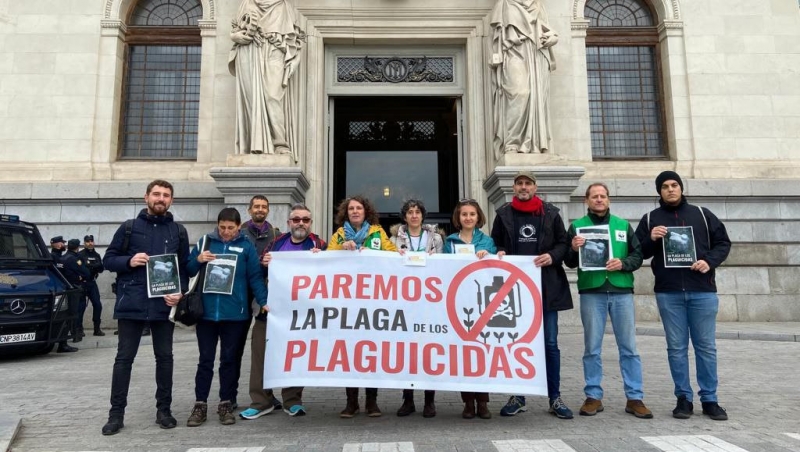November is a decisive month for truly sustainable food and agriculture in the European Union. For the first time in its history, it will decide whether to reduce the use of pesticides throughout the EU. Spain is the largest pesticide user in Europe and the government is actively trying to weaken the proposals. Against this backdrop, more than 150 farming, scientific, consumer, food and environmental organisations sent a petition to the Spanish Prime Minister calling for decisive and unwavering support for the transition to pesticide-free agriculture. The Plague of Pesticides manifesto, which is also addressed to the heads of the Ministries of Agriculture, Health, Environment and Consumer Affairs, contains a decalogue of concrete proposals to promote a just transition, leaving no one behind.
The text denounces that the widespread use of synthetic chemicals to eliminate plant and animal species considered to be pests causes serious problems that science links to an increased risk of diabetes, reproductive and respiratory disorders, neurological dysfunctions and cancer in humans. In addition, their impact can be seen in the reduction of biodiversity, such as the hecatombing of invertebrate populations, and in the worsening of the state of ecosystems and natural resources.
Regulation on the Sustainable Use of Pesticides
Given the urgency, the signatories consider that political action can no longer be delayed. Between the 20th and 23rd of this month, the European Parliament and Council will decide whether and under what conditions they support the European Commission's (EC) proposed Regulation on the Sustainable Use of Plant Protection Products (PPPs). If the current version succeeds, member states will have to reduce the use and risk of these active substances by 50% by 2030. But civil society organisations warn that the text is in danger of being rejected or its ambition diluted if a consensus is not reached before next year's European elections.
The organisations recall that the European institutions must include measures to address the import of products that have been produced with lower levels of sustainability in the use of pesticides.
10 more years of dangerous glyphosate
On 16 November, a decision will be taken on whether to ban the use of glyphosate, one of the world's most controversial and widely used pesticides. It is classified as a "probably carcinogenic substance" by the World Health Organisation (WHO) and although the EU tried to revoke its authorisation, pressure from agribusiness lobbies and some agricultural organisations ensured that it could continue to be used until 15 December this year.
Now, the EC proposes to renew it for another 10 years, against the warning of science and the United Nations, which believes that the precautionary principle is not being sufficiently taken into account in our territory. Brussels is using reasons of shortages and unsustainability for farmers as grounds for its authorisation, an untenable and incoherent argument for the signatory organisations in the current context of waste and squandering in which a third of the food produced ends up in the rubbish bin. An example of this is the destruction last week of 22 million bananas from the Canary Islands to avoid falling prices.
For all these reasons, the organisations that have signed the manifesto The Plague of Pesticides are calling for a firm commitment from the Spanish government to reduce the dramatic contamination by pesticides in Europe, especially during the six-month Presidency of the EU Council, which is about to come to an end. "Never before in history has an EU Presidency coincided with the possibility of negotiating a binding regulation to reduce the use of pesticides. We ask the Spanish government for commitment and coherence in order not to miss this historic opportunity," say representatives of the signatory associations.
The signatories also call on the Minister of Agriculture, Fisheries and Food, as representative of the Spanish government in Europe, to be consistent with his own statements in which he stressed that "organic production is key to meeting the challenge of climate change". The organisations are therefore confident that the demands of civil society will be taken on board in order to move towards an agriculture and rural environment that is not dependent on toxic substances. "The time is now, when there is still time and resources for a socially just transition. Waiting any longer will force an abrupt reconversion, which will put family farming models, among others, in serious trouble," they conclude.
Read more here (in Spanish) on the website of our member Ecologistas en Acción.
